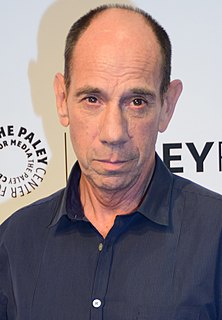A Quote by Miguel Ferrer
People ask me all the time how I prepare and, to tell you the truth, I think if what's on the page is rich and compelling, as far as I'm concerned, if it's beautifully presented on the page, all you have to do is put yourself there and pretend, and the rest takes care of itself. That is, unless it's a real stretch with an accent or if history matters where research has to be done.
Related Quotes
They ask how the universe is arranged, philosophers, mathematicians, and they draw pretty pictures, impossibilities on the page. They save phenomena by telling one ugly lie after another, epicycles upon epicycles, and the fools care not. It is not enough, I tell you, to ask how the cosmos is designed. We must ask why.
If it bothers me on the page, I don't do it. If it attracts me on the page and moves me, makes me think a bit, makes me laugh, makes me cry, I'm interested in it. If it's there on the page, it means it's there and up to me to bring it out. I have done some films along the way that have been screwed up and not as good as they read. Some films that are not that good on the page turn into good movies. So I'm fallible is what I'm saying.
When you're writing TV or movies your vernacular is time, it's all based on rhythms, a character takes a beat or two characters have a moment, like everything is about time. And when you're writing a comic, everything is about space. It's how many panels to put on a page, when should you do a full page splash, what is the detail that you see in any particular image.
When I was writing the memoir, every page was a battle with myself because I knew I had to tell the truth. That's what the memoir form demands. I also had to figure out how much of the truth do I tell, how do I make the truth as balanced as I possibly can? How do I make these people as complicated and as human and as unique and as multifaceted as I possibly can? For me, that was the way I attempted to counteract some of that criticism.
Yes, the fear of its blankness. At the same time, I kind of loved it. Mallarmé was trying to make the page a blank page. But if you're going to make the page a blank page, it's not just the absence of something, it has to become something else. It has to be material, it has to be this thing. I wanted to turn a page into a thing.




































